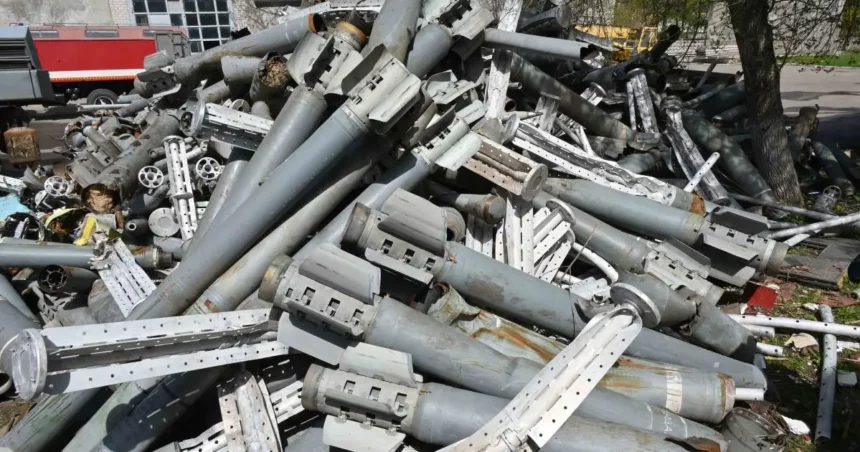Report: US sending cluster munitions to Ukraine via Germany
Germany has publicly opposed the transfer of banned cluster munitions, but new evidence indicates it may be facilitating it. That stand is at odds with its longstanding support for the 2008 Convention on Cluster Munitions banning these weapons.
Cluster munitions are delivered from aircraft or fired in rockets, missiles, and artillery projectiles. They open in the air to disperse multiple submunitions over a wide area and many fail to detonate as designed and pose a long-lasting danger, like landmines.
Repeated Russian cluster munition attacks have killed and injured hundreds of Ukrainian civilians since 2022, while Ukrainian forces have also used cluster munitions, resulting in civilian casualties. Since July 2023, U.S. President Joseph Biden has approved five transfers to Ukraine of U.S. cluster munitions delivered by 155mm artillery projectiles and by ballistic missiles.
Russia, Ukraine, and the United States have not joined the cluster munitions treaty, which prohibits the weapons. However, 112 countries, including Germany, have ratified the treaty because of the foreseeable harm caused to civilians. At least 35 countries party to the convention regard the transit and foreign stockpiling of cluster munitions as prohibited by the convention.
When the U.S. transfers were first announced, more than two dozen world leaders expressed concern. German Foreign Minister Annalena Baerbock said that as a member of the Convention on Cluster Munitions, Germany “opposes sending cluster munitions to Ukraine.”
That principled stand has been brought into question following a documentary by Germany media outlet ARD’s “Panorama” program, which aired July 25. A spokesperson for the U.S. Army for Europe and Africa confirmed in writing to ARD that U.S. 155mm M864 and M483A1 cluster munition artillery projectiles are stored at the U.S. Army’s ammunition storage depot in Miesau in Rhineland-Palatinate, Germany. From there, ARD reported, they have been shipped to Ukraine as part of U.S. military assistance, transiting across Germany and Poland in the process.
When asked to comment on the ARD report, a Defense Department spokesperson, Charlie Dietz, told Responsible Statecraft that “it is general U.S. policy to not discuss specific details of military logistics or the movement of munitions for security reasons.” He did not deny that U.S. cluster munitions held at the U.S. base in Germany have been transferred to Ukraine and said, “the movement of munitions and all other items by the U.S. military is done in accordance with U.S. obligations under applicable international agreements, U.S. law, and DoD regulations, including safety standards.”
Germany’s “Status of Forces Agreement” with the U.S. stipulates how Germany hosts U.S. troops on its territory. There is little transparency surrounding the agreement, but it appears to be permissive when it comes to cluster munitions. This is because U.S. stocks of cluster munitions held on American military bases in Germany are not regarded under the agreement to be under German jurisdiction and control.
Germany’s defense minister and other officials told ARD that they could not confirm the presence of U.S. cluster munitions on military bases in Germany and had no knowledge about whether U.S. cluster munitions have passed through German territory or its airspace. But the U.S. Army spokesperson told ARD that German armed forces receive “documentation of the contents of the shipments” of munitions sent from the U.S. base at Miesau.
This news is dismaying given Germany’s exemplary leadership role in the convention. Germany was among the first 30 ratifications to trigger the convention’s entry into force on August 1, 2010. It hosted a major international conference on the destruction of cluster munitions stocks in Berlin in 2009 and completed the destruction of its cluster munition stockpile in 2015. Germany served as president of the convention in 2017.
In contrast, the United States did not participate, even as an observer, in the 2007–2008 Oslo Process that created the convention. However, U.S. Department of State cables made public by Wikileaks show that Washington attempted to influence its allies, partners, and other states during the process to affect the outcome of the negotiations, especially with respect to the issue of “interoperability” – joint military operations between the U.S. and states parties to the convention.
The U.S. withdrew its cluster munition stocks from its bases in Norway and the United Kingdom in 2010, but the cables released by Wikileaks showed it may still stockpile cluster munitions in states parties such as Germany, Italy, and Spain. The U.S. government has not responded to repeated calls from civil society groups to provide details on the specific types, quantities, and dud rates of the cluster munitions transferred to Ukraine or on the transit points and anticipated end date for the transfers.
President Biden should immediately halt the transfer of cluster munitions given the significant short-term and long-term humanitarian and human rights risks to civilians. Washington should take steps to accede to the Convention on Cluster Munitions without delay.
Meanwhile, Germany should tell the United States to remove its stocks of cluster munitions without delay. It should be clear in opposing any transit of cluster munitions across its territory, airspace, or waters.
All countries that are party to the convention should call for ending the transit and foreign stockpiling of cluster munitions. They should not intentionally or deliberately assist, induce, or encourage any activity prohibited under the Convention on Cluster Munitions.
By: Mary Wareham
Source: responsiblestatecraft.org







